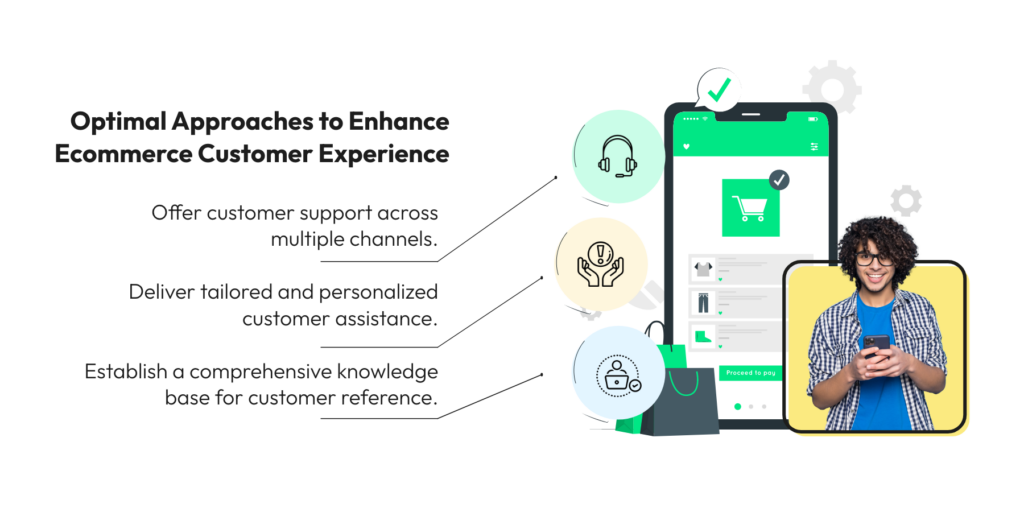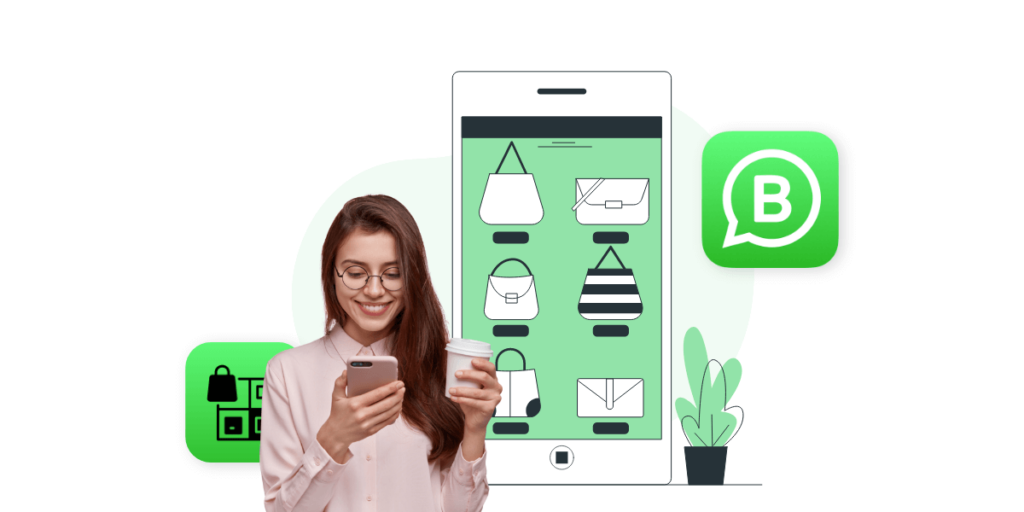Why WhatsApp for eCommerce?

Navigating the vast realm of online business strategies can be daunting. Amidst myriad platforms and tools available, making the right choice is paramount. This brings us to an essential question: Why choose WhatsApp for eCommerce? The answer, as we’ve witnessed at our platform, is manifold, encompassing aspects like immediacy, trust, and a truly personalized experience.
1. Direct and Immediate Communication with Customers
In the fast-paced world of online shopping, time is of the essence. Customers today demand immediate answers and swift solutions. WhatsApp for eCommerce capitalizes on this need by enabling direct customer communication. Unlike traditional email or even some messaging platforms, which might involve delays or automated bots, WhatsApp facilitates real-time human interactions. This speed and directness often translate to increased customer satisfaction and higher conversion rates.
2. Enhanced Customer Service Possibilities
With WhatsApp for eCommerce, gone are the days of long wait times on customer service hotlines or sifting through cluttered email inboxes. The platform provides a streamlined channel for addressing queries, resolving issues, and even processing returns or exchanges. At platform, we’ve noticed a trend: businesses that leverage WhatsApp for customer service often report enhanced customer loyalty and repeated sales.
3. Story-driven Sales through WhatsApp Statuses
The beauty of WhatsApp statuses lies in their ability to craft compelling narratives without seeming intrusive. For brands, this means an opportunity to showcase products, share testimonials, or announce limited-time offers. Such storytelling methods embedded in WhatsApp for eCommerce not only foster brand visibility but also drive consumer engagement in a more organic manner.
4. Trust Factor: End-to-End Encryption and Security Features
One of the chief concerns for online shoppers today is data security. Here, WhatsApp shines with its robust end-to-end encryption, ensuring that all communications remain confidential. By choosing WhatsApp for eCommerce, businesses send a clear message to their customers: their privacy is paramount. Such assurances inevitably lead to greater trust, a cornerstone for any successful online venture.
5. Potential for Personalizing the Shopping Experience
Lastly, the magic of WhatsApp for eCommerce is truly realized when businesses harness its capabilities to offer a personalized shopping experience. Be it sending curated product lists, giving exclusive sneak peeks, or even providing tailored shopping advice, WhatsApp enables brands to make every customer feel special. This level of customization, as we’ve observed at our platform, often results in increased sales and long-term brand loyalty.
In essence, while there are myriad tools and platforms available to online retailers, the unique amalgamation of directness, storytelling, security, and personalization that WhatsApp offers makes it a standout choice. As the digital market evolves, WhatsApp for eCommerce remains a consistent and influential force, driving sales and shaping customer experiences.
Features of WhatsApp Business
WhatsApp Business isn’t just a regular messaging app with a business tag; it’s equipped with tools tailor-made for commercial endeavors. One of the key features is the ‘Business Profile’, allowing retailers to furnish essential information such as operating hours, location, and contact details, thus offering a snapshot of their enterprise at a glance. Additionally, ‘Quick Replies’ enable businesses to craft and store responses for frequently asked questions, ensuring timely and consistent communication.
Atoru platform, we’ve often emphasized the importance of analytics, and WhatsApp Business doesn’t disappoint. The built-in ‘Messaging Statistics’ offers insights into metrics like message delivery, open rates, and responses, providing a pulse on customer engagement and areas for improvement.
Catalog Feature: Showcasing Products Directly on the Platform
A standout feature in the realm of WhatsApp for eCommerce is the ‘Catalog’. Rather than redirecting customers to external websites or apps, businesses can showcase their products or services directly within WhatsApp. This not only reduces friction in the shopping journey but also ensures a smoother, more integrated experience. Paired with the potential for personalized shopping experiences, where businesses can suggest specific catalog items based on user preferences or past interactions, the catalog feature is nothing short of revolutionary.
Automated Responses for Streamlined Customer Interaction
In today’s digital age, immediacy is key. Recognizing this, WhatsApp Business offers ‘Automated Responses’. Be it greeting a potential customer, confirming an order, or addressing common queries, automated messages ensure that the direct customer communication ethos of WhatsApp for eCommerce is maintained even during off-hours or high traffic periods.
In wrapping up, WhatsApp Business is not just a tool; it’s a transformative force in the landscape of online retailing. With its unique features and customer-centric approach, it empowers businesses to harness the full potential of WhatsApp for eCommerce. As the digital marketplace evolves, those adept at leveraging WhatsApp Business are poised to lead the charge, setting new standards in customer engagement and sales growth.
Integrating WhatsApp with Your eCommerce Strategy

In today’s hyper-digitalized era, merely having an online presence isn’t enough. eCommerce brands need to be proactive, agile, and customer-centric. With the myriad tools available, the integration of WhatsApp for eCommerce can significantly elevate a brand’s digital strategy, offering both efficiency and intimacy in customer interactions. Drawing from our expertise at Wati, let’s delve into the nuances of melding WhatsApp seamlessly into your eCommerce game plan.
Setting Up Your WhatsApp Business Account
Before diving deep, the first step is to establish a solid foundation. Create a WhatsApp Business account distinct from your personal one. This separation ensures professionalism and aids in organization. Populate your business profile with essential details—brand story, contact information, operating hours—to give potential customers a clear snapshot of your enterprise.
Effective Utilization of Broadcasting and Labeling Features
One of the standout features in WhatsApp for eCommerce is the ‘Broadcasting’ function. Unlike standard group messages, broadcasts allow you to send personalized messages to selected contacts without them seeing each other. This feature is invaluable for sharing promotions, new arrivals, or exclusive offers.
Couple this with ‘Labeling’, a feature that enables categorization of chats (e.g., ‘New Customer’, ‘Pending Payment’). This helps streamline follow-ups, manage customer relationships, and ensure no query or transaction falls through the cracks.
Building and Managing Customer Lists
Harnessing the power of WhatsApp for eCommerce is intricately tied to how you manage your customer lists. Regularly update and segment your lists based on purchase history, interaction frequency, or even preferences. Such segmentation aids in delivering more tailored and personalized shopping experiences.
Crafting Engaging and Actionable Messages
Being direct doesn’t mean being bland. Messages, especially those utilizing WhatsApp statuses, should be crafted to engage, inform, and prompt action. Whether it’s a limited-time discount, a product launch, or just a brand update, your content should resonate with your audience, driving both interest and conversions.
Collecting Feedback and Reviews
Feedback is the cornerstone of continuous improvement. Use WhatsApp for eCommerce to solicit reviews post-purchase or after resolving a query. Such direct feedback mechanisms not only provide insights into areas of improvement but also foster a sense of community and trust among your customers.
In summation, integrating WhatsApp into your eCommerce strategy isn’t just about leveraging a popular platform; it’s about capitalizing on direct, immediate, and personalized communication channels. As the landscape of online retail becomes increasingly competitive, the brands that truly harness the potential of WhatsApp for eCommerce are set to differentiate themselves, offering unparalleled customer experiences and driving consistent growth.
Challenges & Considerations for Using WhatsApp in eCommerce
While the integration of WhatsApp for eCommerce presents a myriad of advantages, it’s crucial to approach this avenue with a balanced perspective. Like all tools, WhatsApp has its challenges and considerations that businesses should be aware of. At our platform, our deep dive into the platform’s intricacies has illuminated some key areas that online retailers need to navigate wisely.
Data Privacy Concerns
In an era where data privacy is paramount, businesses need to be acutely aware of how they handle and store customer information. While WhatsApp boasts end-to-end encryption, ensuring secure communication, brands must ensure they do not misuse the platform to extract or store customer data without explicit consent. Leveraging WhatsApp for eCommerce means walking the fine line of personalized communication while respecting user privacy.
Handling a Large Volume of Messages
The allure of direct customer communication means that businesses might get inundated with messages. From queries and feedback to orders and complaints, the influx can be overwhelming. Without proper organization, response protocols, and perhaps even dedicated personnel, there’s a risk of missing out on crucial interactions or delaying responses.
Potential Over-Reliance on a Single Platform
Diversification is a golden rule in business. While the potentials of WhatsApp for eCommerce are undeniable, brands should avoid putting all their eggs in one basket. It’s essential to maintain a multi-channel approach, ensuring that if one platform faces issues or changes its policies, the business doesn’t suffer disproportionately.
Customer Perception and Expectation Management
Given the personal nature of WhatsApp, some customers might have heightened expectations regarding response times or the kind of support they should receive. Managing these expectations, setting clear guidelines on response times, and ensuring consistent quality in interactions are paramount.
The journey of leveraging WhatsApp for eCommerce is not without its bumps. However, with careful consideration, strategic planning, and by staying attuned to the platform’s evolving landscape, businesses can mitigate challenges and extract maximum value. At, our emphasis has always been on holistic strategies, ensuring that while we harness the power of tools like WhatsApp, we’re always prepared, adaptive, and customer-centric.
